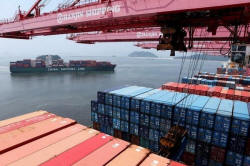|
Hanjin Shipping parent
raising funds to unload stranded cargo
 Send a link to a friend
Send a link to a friend
 [September 06, 2016]
By Joyce Lee and Hyunjoo Jin [September 06, 2016]
By Joyce Lee and Hyunjoo Jin
SEOUL (Reuters) - Hanjin Shipping Co's
parent firm plans to raise 100 billion won ($90 million) to fund the
unloading of billions of dollars worth of cargo aboard vessels
stranded around the world in the wake of its court receivership
filing last week.
Those funds may be matched by a separate 100 billion won in loans
that South Korean government officials have said government-backed
creditors are ready to provide if Hanjin Group, the parent firm,
provides collateral. Hanjin Group is considering the offer.
The collapse of the world's seventh-largest container carrier has
caused havoc in global trade networks and a surge in freight rates,
as more than half of Hanjin's ships have been blocked from docking
with ports and lashing firms fearing they won't be paid. Some
vessels have also been seized.
Whether those funds would be sufficient to resolve cargo unloading
problems was not clear. A spokeswoman for Hanjin Shipping was not
immediately available for comment on the issue.
Hanjin Shipping, which many analysts and industry insiders expect
eventually to be liquidated, had about 600 billion won in unpaid
obligations such as charter fees and terminal use fees as of
end-August. Its debt stood at 6 trillion won at the end of June and
a bankruptcy would be the container shipping industry's largest.

HP Inc <HPQ.N>, one of roughly 8,000 current Hanjin cargo owners,
has tens of millions of dollars worth of computers and printers in
more than 500 of the carrier's containers, it said on Monday in
documents supporting Hanjin's U.S. bankruptcy filing.
"The ongoing disruption to HP's supply chain caused by the Foreign
Debtor's bankruptcy filings is material, costly, and worsening on a
daily basis," it said.
A senior official at the U.S. government's shipping watchdog has
warned Hanjin, other shippers and freight forwarders against taking
the opportunity to price gouge cargo customers.
William Doyle, one of five commissioners of the U.S. Federal
Maritime Commission, told Reuters: "(Hanjin) was contemplating tying
their containers to any release of cargo by basically making the
sale of the actual container – at $1,500 per container - a condition
for the release of cargo to shippers and cargo owners".
As of late Monday, 70 Hanjin ships have been denied access to ports
and three have been seized by creditors through court orders - one
in Singapore and two in unidentified locations in China.

[to top of second column] |

A crane carries a container from a Hanjin Shipping ship at the
Hanjin container terminal as a China Shipping Line ship (L) arrives
at the Busan New Port in Busan, about 420 km (261 miles) southeast
of Seoul, August 8, 2013. REUTERS/Lee Jae-Won/File Photo - RTX2O4TB

Hanjin has 141 ships, of which 128 are operating. Most are container
ships although it has some dry bulk carriers. They are carrying
cargo worth 16 trillion won, the Korea International Trade
Association said on Monday.
For those on board the ships, there is little clarity on when they will be able
to dock.
"We are waiting indefinitely. There is no word besides what we see on the news,
that the government is making efforts for Hanjin Shipping. We are waiting for a
call," Park Kong-soon, captain of the Hanjin Atlanta, floating east of Tokyo
Port, told Reuters by satellite phone.
He said the ship has about 10 days worth of meals and 20 days worth of other
foodstuffs for its crew of 20.
Hanjin received court approval on Monday to spend funds essential to operating
ships, such as food for crew members, and plans to supply seven vessels that
urgently need supplies on Tuesday. Many vessels have months of supplies.
Although expectations that Hanjin Shipping will be able to survive are low, the
stock surged 30 percent on Tuesday, the daily limit, as investors made
speculative bets on a stock that hit an all-time low on Monday. The shares have
lost 15 percent since news of the collapse emerged last week.
($1 = 1,103.6100 won)
(Additional reporting by Nataly Pak, Se Young Lee, Cynthia Kim, Lee Chang-ho,
Yun Hwan Chae and Jeong-eun Lee in Seoul and Keith Wallis in Singapore; Writing
by Tony Munroe; Editing by Muralikumar Anantharaman and Edwina Gibbs)
[© 2016 Thomson Reuters. All rights
reserved.] Copyright 2016 Reuters. All rights reserved. This material may not be published,
broadcast, rewritten or redistributed.
 |